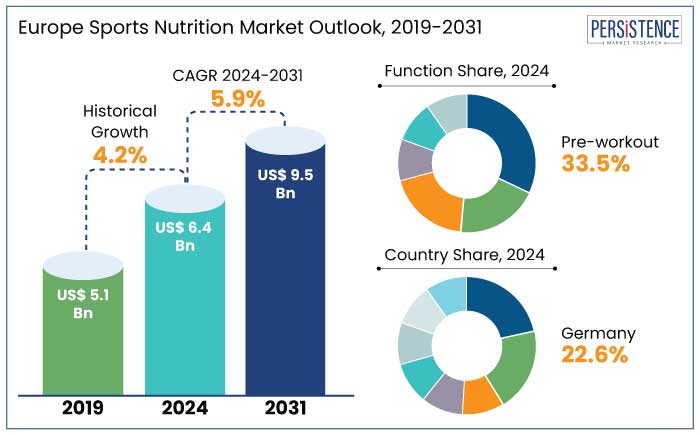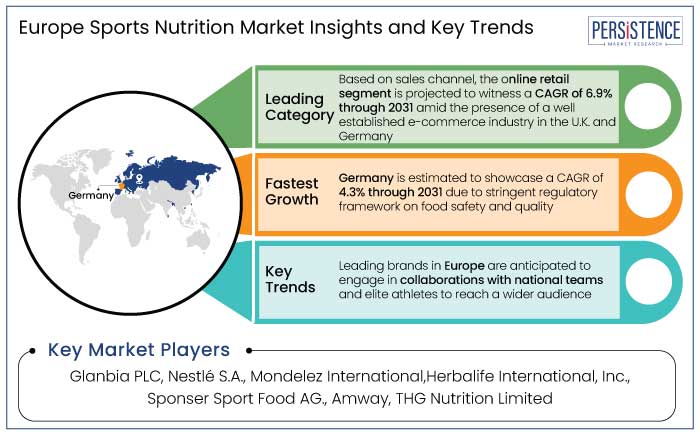Industry: Food and Beverages
Published Date: November-2024
Format: PPT*, PDF, EXCEL
Delivery Timelines: Contact Sales
Number of Pages: 177
Report ID: PMRREP34896
The Europe sports nutrition market is estimated to increase from US$ 6.4 Bn in 2024 to US$ 9.5 Bn by 2031. The market is projected to record a CAGR of 5.9% during the forecast period from 2024 to 2031. Increasing prevalence of cancer, obesity, cardiovascular diseases, and diabetes across Europe is anticipated to create new opportunities for sports nutrition brands.
As per the European Commission, throughout 2019, the percentage of overweight adults in the European Union (EU) ranged from 37% in Italy to 58% in Croatia for women, and from 53% in France to 73% in Croatia for men. These numbers are predicted to rise with increasing adoption of sedentary lifestyles and surging consumption of junk food. Hence, sports nutrition demand is likely to rise among those living with obesity to maintain their health.

Key Highlights of the Market
|
Market Attributes |
Key Insights |
|
Market Size (2019) |
US$ 5.1 Bn |
|
Market Size (2024E) |
US$ 6.4 Bn |
|
Projected Market Value (2031F) |
US$ 9.5 Bn |
|
Europe Market Growth Rate (CAGR 2024 to 2031) |
5.9% |
|
Historical Market Growth Rate (CAGR 2019 to 2023) |
4.2% |
|
Country |
Market Share in 2024 |
|
Germany |
22.6% |
The demand for natural health products is likely to rise significantly in Germany during the forecast period. Increasing health consciousness and commitment to active lifestyles, including fitness, weight management, and wellness is anticipated to boost growth.
Established fitness industry in Germany comprising several gyms, sports clubs, and wellness facilities, fosters a vibrant community of fitness enthusiasts and athletes. They are set to frequently consume sports supplements, protein products, and other performance enhancers.
The country’s strict regulatory framework on food quality and safety also builds consumer trust by ensuring sports nutrition products meet rigorous standards. Additionally, Germany’s central location within Europe and its efficient distribution networks enable seamless production and supply of sports nutrition products. Together, these factors solidify the country’s prominent role in the regional market.
|
Category |
Market Share in 2024 |
|
Function - Pre-workout |
33.5% |
Based on function, the pre-workout segment will likely generate around 33.5% of the Europe sports nutrition market share in 2024. Modern consumers, recognizing the benefits of pre-workout supplements are adding these products to their fitness regimens to enhance performance.
Designed to deliver a quick energy boost and reduce fatigue, pre-workout supplements commonly include ingredients like caffeine, beta-alanine, and nitric oxide boosters. These supplements are especially favored by gym-goers and athletes in need of consistent energy and mental focus, aligning well with Europe’s strong culture of fitness.
Pre-workout supplements are also gaining popularity due to their ease of use as well as availability in various forms such as powders, liquids, and ready-to-drink options. Their accessibility has grown with the rise of e-commerce and in-gym sales, reaching a wider audience.
Modern consumers prioritize scientifically supported, safe, and effective products. It is driving brands to emphasize ingredient transparency and quality by highlighting the presence of clinically tested components. This surging focus resonates with health-conscious buyers who seek trustworthy and high-performance products.
|
Category |
CAGR through 2031 |
|
Sales Channel - Online Retail |
6.9% |
Online retail is projected to drive substantial growth in the Europe sports nutrition industry. It will likely be propelled by easy access to a wide range of products, right from protein supplements to specialized items like vegan protein powders and gluten-free energy bars.
Rapid shift to e-commerce has also democratized the market, allowing both amateur and professional athletes to easily incorporate these products into their routines. Consumers benefit from the convenience of browsing, comparing, and purchasing sports nutrition products online. This is further supported by digital marketplaces and innovative payment options like ‘buy now, pay later.’ For instance,
The robust e-commerce infrastructure supports sports nutrition brands in leveraging targeted digital marketing, data analytics, and consumer insights. These strategies are projected to help personalize experiences, foster brand loyalty, and cater to niche demands, setting a trend for continued online market expansion.
The Europe sports nutrition market is experiencing significant growth driven by increasing health consciousness among modern consumers. Rising participation in sports and fitness activities and high consumer demand for functional foods are also expected to boost sales.
The market encompasses a wide range of products, including protein supplements, energy drinks, protein bars, pre-workout formulas, and specialized supplements. These are aimed at improving athletic performance, endurance, and recovery. In recent years, the surge in fitness activities among all age groups, especially young adults and fitness enthusiasts, has fueled the demand for these products.
One of the key trends in the Europe endurance supplements industry is the increasing focus on clean-label, natural, and sustainable products. As consumers become more health-conscious and environmentally aware, they are seeking products free from artificial ingredients and with minimal environmental impact.

From 2019 to 2023, the Europe sports nutrition market experienced significant growth at a CAGR of 4.2%. It was driven by increasing health consciousness and a rising interest in fitness among consumers. This period also witnessed a marked shift in dietary preferences, with more individuals prioritizing nutritional supplements to enhance athletic performance and recovery.
The rise of e-commerce further facilitated access to a broad range of products, allowing brands to reach diverse consumer segments more effectively. Additionally, the growing trend toward plant-based diets contributed to the popularity of vegan protein powders and natural supplements, appealing to a wider audience.
The market is set to continue evolving in response to emerging health trends and consumer preferences. It is predicted to rise at a CAGR of around 5.9% through 2031.
Increasing focus on personalized nutrition will likely intensify, with brands developing tailored products that address specific fitness goals and dietary needs. Innovations in ingredient sourcing, such as the use of sustainably sourced and organic ingredients are also projected to play a key role in developing product offerings.
Advancements in technology and digital marketing strategies are also set to enable companies to engage more effectively with consumers. These are anticipated to help foster brand loyalty and extend market reach. The integration of wellness and fitness into everyday lifestyles will likely sustain growth, bolstering the Europe sports nutrition supplements market through 2031.
Rising Emphasis on Healthy Living among Modern Individuals to Spur Demand
As individuals in Europe increasingly prioritize healthy living, there is a rising demand for sports nutrition products that aid in achieving fitness goals and enhancing wellness. This proactive health approach attracts both fitness enthusiasts and individuals seeking better nutrition. Products that promote muscle recovery and energy enhancement, particularly protein supplements, have become staples in various diets. These are set to gain traction due to their high effectiveness in muscle maintenance regardless of athletic involvement.
The popularity of plant-based and organic sports nutrition reflects consumers' growing preference for clean, sustainably sourced ingredients. Public health campaigns and social media influencers significantly impact consumer education regarding balanced nutrition and the importance of protein intake.
Initiatives by health organizations are set to promote healthy habits, while fitness influencers are likely to advocate for sports nutrition products on platforms like Instagram and YouTube. This rising health awareness is projected to continue driving demand, making sports nutrition a key growth area in Europe’s health and wellness industry.
Launch of Plant-based, Clean Products to Bolster Growth
Several brands are now emphasizing organic ingredients, plant-based proteins, and recyclable or biodegradable packaging to meet this demand. For instance, plant-based protein products are gaining traction due to the growing number of vegan, vegetarian, and flexitarian consumers, especially in countries like Germany and the United Kingdom. This shift aligns with broader environmental values, where consumers are concerned about sourcing and the sustainability of raw materials.
Well-established companies are making significant strides in the vegan sports nutrition market by broadening their product lines. They are including both pre- and post-workout options alongside their traditional protein powders. Innovations in a diverse range of plant-based proteins have also led to the development of high-protein bars in enticing flavors. For instance,
The aforementioned development highlights the industry's commitment to catering to the growing demand for delicious yet nutritious vegan alternatives in sports nutrition.
Premium Pricing May Hamper Demand from Low-income Demographics
Premium pricing in Europe sports nutrition market acts as a significant restraint on accessibility for certain consumers. High costs associated with premium products can limit the purchasing power of individuals. It is particularly evident among those from lower-income demographics or those who do not prioritize fitness-related expenditures.
Various brands justify their high price points by emphasizing superior ingredients, extensive research, or endorsements from renowned athletes. The aforementioned strategies are projected to create challenges for new market entrants, as they struggle to compete against established brands like USN and Optimum Nutrition. These brands have successfully cultivated strong consumer loyalty through aggressive marketing and sponsorship of sporting events. As a result, modern consumers often seek alternatives outside traditional sports nutrition.
Millennials are set to favor natural or organic food items that are perceived as healthier and more affordable. While premium pricing can signify quality and exclusivity, it simultaneously restricts market penetration and limits access to broad audience. Brands may need to reconsider their pricing strategies to attract a more diverse consumer base. This is ultimately projected to help balance quality with affordability to enhance accessibility in Europe.
Brands to Collaborate with Popular Athletes and Teams to Enhance their Reach
Strategic alliances with athletes and sports organizations are set to present a significant opportunity for Europe sports nutrition market growth. These partnerships are likely to help enhance brand visibility, credibility, and influence. Collaborations with elite athletes or national teams are further anticipated to amplify the perceived efficacy of nutritional products, linking them directly to athletic performance. For instance,
Sports organizations and event companies are anticipated to provide new platforms for brands to showcase novel products, thereby increasing awareness among audiences. Additionally, partnerships with governing bodies and sports teams are set to help nutrition companies navigate the competitive landscape. These are projected to help them align with recognizable authorities to build consumer trust and broaden their reach across Europe’s diverse sports nutrition industry.
The Europe sports nutrition industry is highly competitive, driven by established brands and new entrants alike. Key players such as Glanbia (Optimum Nutrition), USN, and MyProtein dominate with strong brand recognition and diverse product offerings across categories like protein supplements, pre-workouts, and recovery products. These companies leverage aggressive marketing strategies, athlete endorsements, and event sponsorships to maintain loyalty and visibility.
Small-scale brands and start-ups, on the other hand, are entering the market by focusing on niche segments like plant-based or allergen-free products to cater to specific consumer needs. The shift to e-commerce also intensifies competition, allowing both large and small brands to reach broad audiences through digital platforms and personalized marketing.
Recent Industry Developments
|
Attributes |
Details |
|
Forecast Period |
2024 to 2031 |
|
Historical Data Available for |
2019 to 2023 |
|
Market Analysis |
US$ Billion for Value |
|
Key Countries Covered |
|
|
Key Market Segments Covered |
|
|
Key Companies Profiled |
|
|
Report Coverage |
|
|
Customization and Pricing |
Available upon request |
By Function
By Form
By Flavor
By Micronutrients
By Sales Channel
By Country
To know more about delivery timeline for this report Contact Sales

It will likely reach a value of US$ 9.5 Bn in 2031 from US$ 6.4 Bn in 2024.
Glanbia Performance Nutrition is considered the largest company in Europe.
It refers to the study and use of nutrition to support various aspects of athletic performance.
Germany is set to be the leading country in Europe for sports nutrition.
Athletes who exercise strenuously for more than 60 to 90 minutes per day require sports nutrition products.